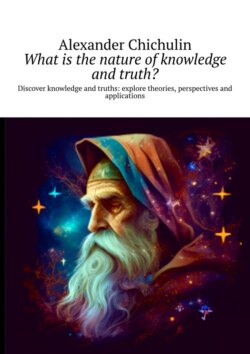What is the nature of knowledge and truth? Discover knowledge and truths: explore theories, perspectives and applications

Реклама. ООО «ЛитРес», ИНН: 7719571260.
Оглавление
Группа авторов. What is the nature of knowledge and truth? Discover knowledge and truths: explore theories, perspectives and applications
1. Introduction: Defining Knowledge and Truth
– What do we mean by knowledge and truth?
– Why are these concepts important to explore?
2. Theories of Knowledge
– Rationalism vs. Empiricism
– Innatism vs. Tabula Rasa
– The Role of Intuition and Experience
3. Theories of Truth
– Correspondence Theory
– Coherence Theory
– Pragmatic Theory
– Consensus Theory
4. Skepticism and Relativism
– Radical Skepticism
– Cultural Relativism
– Moral Relativism
5. Science and Knowledge
– The Scientific Method
– Falsification vs. Verification
– Objectivity vs. Subjectivity
– The Limits of Science
6. The Role of Language and Perception
– The Sapir-Whorf Hypothesis
– Perceptual Relativity
– The Limits of Language and Perception
7. Ethics and Truth
– The Relationship between Ethics and Knowledge
– The Role of Moral Truths
– Moral Realism vs. Moral Subjectivism
8. Knowledge and Truth in Practice
– The Role of Knowledge in Society
– The Importance of Truth-Telling
– The Challenges of Applying Knowledge and Truth
9. Conclusion: Revisiting the Nature of Knowledge and Truth
– Key Takeaways
– Unanswered Questions
– Future Directions for Research
Отрывок из книги
In our everyday lives, we often rely on the concepts of knowledge and truth to make sense of the world around us. We seek to acquire knowledge through our experiences, observations, and interactions with others, and we use this knowledge to inform our beliefs and actions. At the same time, we value truth as a standard of accuracy and reliability, striving to ensure that our beliefs and actions are consistent with the facts of reality.
But what exactly do we mean by knowledge and truth, and how do we come to know what we know? These are fundamental questions that have been explored by philosophers and scholars throughout history, and they continue to be the subject of ongoing debate and inquiry. In this book, we will explore different perspectives on the nature of knowledge and truth, examining the ways in which they are defined, acquired, and applied in various contexts.
.....
Innatism and tabula rasa are two theories of knowledge that focus on the question of whether humans are born with innate knowledge or whether the mind is a blank slate at birth. In this chapter, we will explore the differences between these two approaches.
Innatism is the theory that some knowledge is innate, meaning that it is present in the mind from birth. Innatists argue that the mind has certain structures or faculties that allow us to acquire knowledge, and that these structures are already present in the mind before we have any experiences in the world. Innatists believe that these innate structures provide the foundation for our later knowledge acquisition. For example, an innatist might argue that humans have an innate capacity for language, and that this capacity is activated when we are exposed to language in our environment.
.....